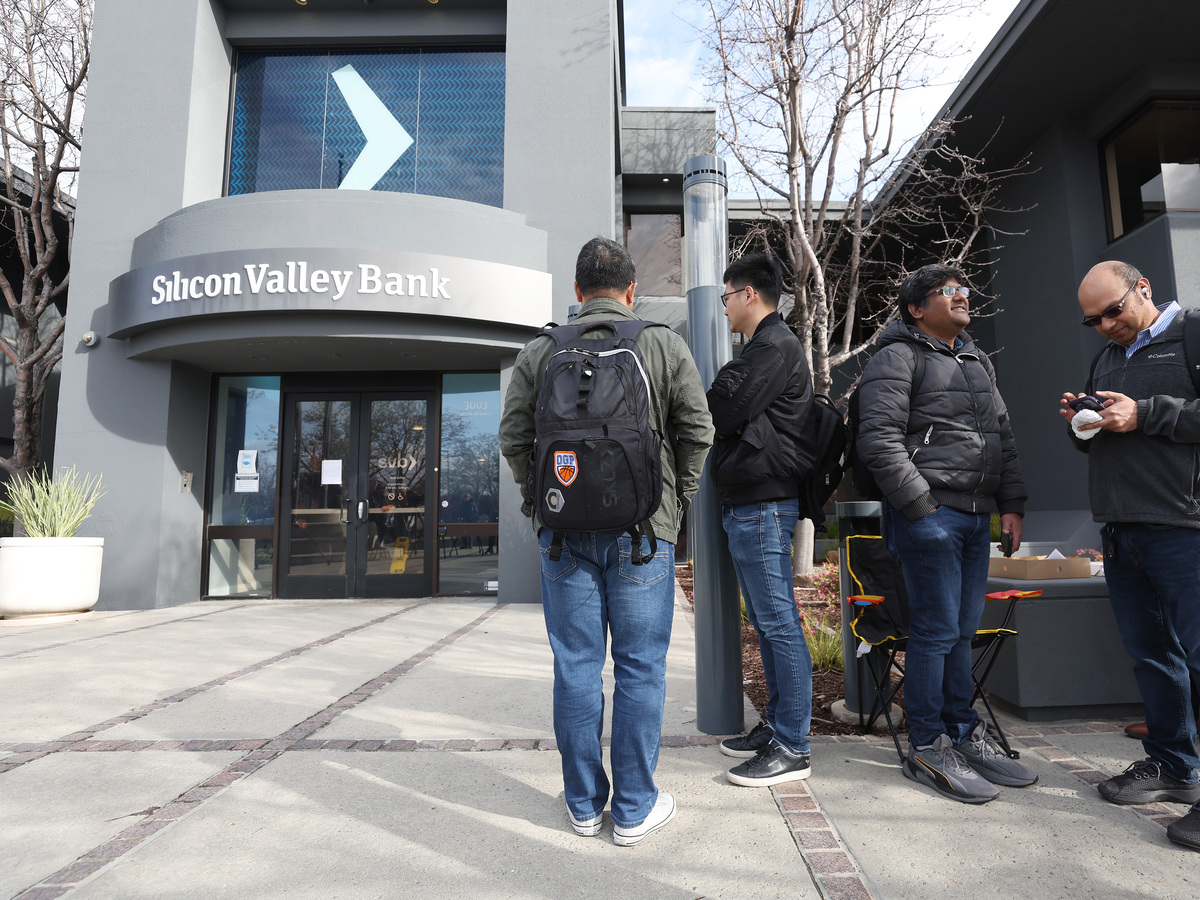
[ad_1]

People line up outdoors of a Silicon Valley Bank workplace on Monday in Santa Clara, Calif. Days after Silicon Valley Bank collapsed, clients are lining as much as try to retrieve their funds from the failed financial institution.
Justin Sullivan/Getty Images
conceal caption
toggle caption
Justin Sullivan/Getty Images

People line up outdoors of a Silicon Valley Bank workplace on Monday in Santa Clara, Calif. Days after Silicon Valley Bank collapsed, clients are lining as much as try to retrieve their funds from the failed financial institution.
Justin Sullivan/Getty Images
After Silicon Valley Bank careened off a cliff final week, jittery enterprise capitalists and tech startup leaders pleaded with the Biden administration for assist, however they made one level clear: “We are not asking for a bank bailout,” greater than 5,000 tech CEOs and founders begged.
On the identical day the U.S. authorities introduced extraordinary steps to prop up billions of {dollars} of the financial institution’s deposits, Treasury Secretary Janet Yellin and President Biden hammered the identical speaking level: Nobody is being bailed out.
“This was not a bailout,” billionaire hedge-fund mogul Bill Ackman tweeted Sunday, after spending the weekend forecasting financial calamity if the federal government didn’t step in.
Yet based on specialists who focus on authorities financial institution bailouts, the actions of the federal authorities this weekend to shore up Silicon Valley Bank’s depositors are nothing if not a bailout.
“If your definition is government intervention to prevent private losses, then this is certainly a bailout,” mentioned Neil Barofsky, who oversaw the Troubled Asset Relief Program, the far-reaching bailout that saved the banking trade throughout the 2008 monetary disaster.
Under the plan introduced by federal regulators, $175 billion in deposits will likely be backstopped by the federal authorities.
Officials are doing this by waiving a federal deposit insurance coverage cap of $250,000 and reaching deeper into the insurance coverage fund that’s paid for by banks.
At the identical time, federal officers are trying to public sale off some $200 billion in belongings Silicon Valley Bank holds. Any deposit help that doesn’t come from the insurance coverage fund, or asset auctions, will depend on particular assessments on banks, or basically a tax that principally bigger banks will bear the brunt of, based on officers with the Federal Deposit Insurance Corp.
Which is to say, the lifeline to Silicon Valley depositors won’t use public taxpayer cash. And stockholders and executives are usually not being saved. But do these two information alone imply it isn’t a bailout?
“What they mean when they say this isn’t a bailout, is it’s not a bailout for management,” mentioned Richard Squire, a professor at Fordham University’s School of Law and an skilled on financial institution bailouts. “The venture capital firms and the startups are being bailed out. There is no doubt about that.”
Avoiding the “tar of the 2008 financial crisis”
Squire mentioned that when prime White House officers keep away from the b-word, they’re “trying to not be brushed with the tar of the 2008 financial crisis,” when U.S. officers realized that sweeping bailouts of bankers is politically unpopular. The White House doesn’t need to be related to “the connotation of rescuing fat cats, rescuing bankers,” he mentioned.
“If we use a different term, we’re serving the interest of those who want to obscure what is really happening here,” Squire mentioned.
Amiyatosh Purnanandam, a company economist on the University of Michigan who research financial institution bailouts, put it this fashion: “If it looks like a duck, then probably it is a duck,” he mentioned. “This is absolutely a bailout, plain and simple.”
Purnanandam, who has performed research for the FDIC on the insurance coverage charges banks are charged, mentioned when a single financial institution’s depositors are absolutely supported by insurance coverage and financial institution charges, the fee will likely be ultimately shouldered by clients throughout the entire U.S. banking system.
“When we make all the depositors whole, it’s akin to saying that only one person in the family bought auto insurance and the insurance company is going to pay for everyone’s accident,” he mentioned. “In the long run, that’s a subsidy because we are paying for more than what we had insured.”
Still, many with ties to tech and enterprise capital are attempting to withstand saying “bailout” and “Silicon Valley Bank” in the identical sentence.
Scott Galloway, a professor of selling at New York University, tweeted that “we need a new word” to explain when shareholders and traders are worn out however financial institution depositors are made complete.
Fordham banking skilled Squire just isn’t so certain the English language must invent new phrases.
“A bailout just means a rescue,” Squire mentioned.
“Like if you pay a bond for someone to get out of jail, rescuing someone when they’re in trouble,” he mentioned. “If you don’t want to use the b-word, that is fine, but that is what is happening here.”
[adinserter block=”4″]
[ad_2]
Source link
